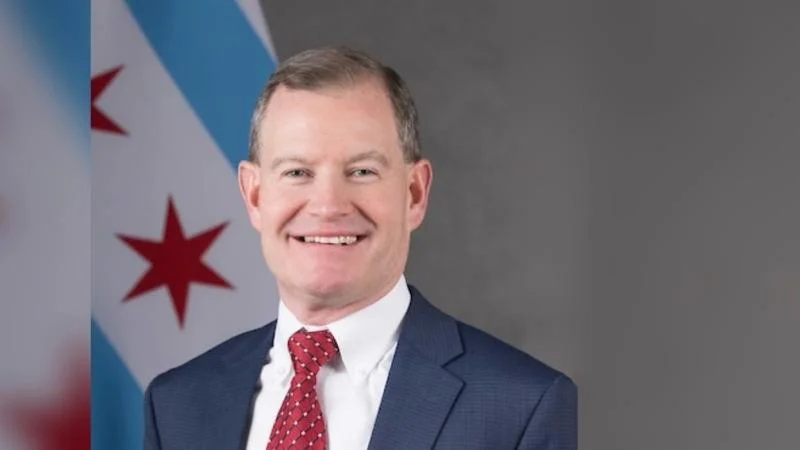Tom Carney- Commissioner of the Chicago Department of Transportation (CDOT) | Chicago city website
Tom Carney- Commissioner of the Chicago Department of Transportation (CDOT) | Chicago city website
Mayor Brandon Johnson and the Chicago Department of Transportation (CDOT) have announced the completion of a major safety project on Milwaukee Avenue, marking the installation of over 100 miles of new bikeways during Johnson’s administration. The announcement comes as Chicago reports a 30 percent decline in traffic fatalities since 2021.
“Building safer streets for pedestrians, cyclists, and drivers is a vital facet of our work building healthy, whole, and safe communities across our city,” said Mayor Brandon Johnson. “Today we celebrate a historic milestone—over 100 miles of new bikeways installed in just the first two years of our administration. These projects are making a real difference in our mission to prevent traffic fatalities and build safer, more livable communities. I look forward to continuing to work with CDOT and leaders like Alderman La Spata as we build out safer transportation network across Chicago.”
CDOT Acting Commissioner Craig Turner commented on the progress: “Chicago has made significant progress in recent years, surpassing 100 miles of new bikeways under Mayor Johnson’s leadership and seeing traffic fatalities continue to decline. Our work on Milwaukee Avenue is just one example of how we’re redesigning streets to reflect the different ways people move around Chicago. We look forward to building on this momentum to make Chicago’s streets even safer and more connected in the years ahead.”
The recently completed project on Milwaukee Avenue between Kinzie Street and Chicago Avenue included resurfacing, installation of concrete protected bike lanes, redesigned intersections, bus boarding islands, and pedestrian safety infrastructure aimed at improving safety for all road users.
Alderman Daniel La Spata reflected on the significance: “It has been wonderful to watch the success of the Chicago Cycling Strategy and I'm so excited to celebrate these first 100 miles of bike lanes under Mayor Johnson. I can't help but think of Sam Bell, a 1st Ward cyclist who lost his life on this stretch several years ago. I believe he would be proud of the work that we celebrate today, to know that his death was not in vain."
Alderwoman Ruth Cruz added: “Hitting this milestone is a real achievement! But it’s also a call to action. We’ve been working continuously to make improvements for pedestrians, cyclists, and drivers throughout the city so that all Chicagoans can move around safely. Each of us has a part to play in making that happen – and these advancements make it easier for all of us to live active, healthy lifestyles.”
Under current leadership, over 100 miles of new bikeways have been constructed citywide; by year-end total mileage will exceed 500 miles. Most new projects focus on low-stress bikeways such as protected bike lanes or neighborhood greenways designed for riders of all ages.
Alex Perez from Active Transportation Alliance stated: “In the past few years, Chicago streets have benefited from a surge in the number of protected bike lanes CDOT has been installing. Milwaukee Avenue, known as the busiest cycling street in the city, is finally becoming a protected bike lane corridor as sections of the street get upgraded with concrete protection. We celebrate the completion of the Milwaukee Avenue project between Chicago Avenue and Kinzie Street. It’s important to note that the infrastructure changes made on Milwaukee Avenue is about creating a safer environment for all road users — people walking, biking, and driving. The rise in crashes involving people walking and biking across Chicago has triggered more awareness of the need for safer infrastructure on our streets. By focusing on building streets that are safer for all road users we would create a culture of slower, safer driving that could help prevent these tragedies.”
These investments coincide with record ridership numbers reported by Divvy—Chicago's publicly owned bike- and scooter-sharing system—which saw over five million trips so far this year including consecutive monthly records during July and August.
Sean Madison from Divvy remarked: "August's record 995,000 Divvy rides shows what happens when great infrastructure meets accessible micromobility. Milwaukee Avenue's protected lanes make people feel safe enough to choose bikes and scooters, and our expanded network of stations, devices, and charging infrastructure ensures Lyft is there to serve and connect Chicagoans when they need it. This is how cities transform, one ride at a time."
While national figures show an estimated eight percent drop in U.S traffic deaths since 2021 (https://www.nhtsa.gov/press-releases/early-estimate-traffic-fatalities-2023), Chicago's reduction stands at about thirty percent despite rising travel volumes after COVID-19 restrictions eased.
Preliminary data through August indicate ongoing improvement locally; there were 64 total traffic fatalities—including 22 pedestrian deaths—the lowest year-to-date figures seen by officials in over ten years.
Ongoing funding from initiatives such as Build Better Together allows CDOT projects across neighborhoods throughout the City to include Complete Streets features like curb extensions or raised crosswalks intended both for visibility enhancement and speed reduction.
Further information about ongoing transportation projects can be found at Chicago.gov/CompleteStreets.






 Alerts Sign-up
Alerts Sign-up